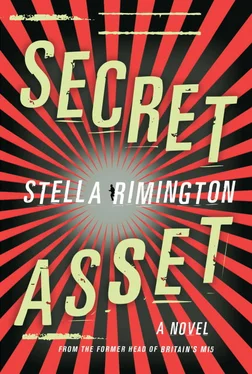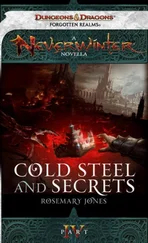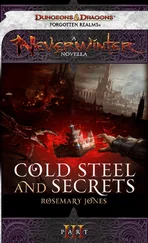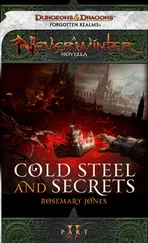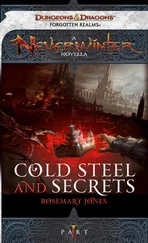“Was he right about Tom? Is he anti-Semitic?”
Margarita deliberated for a moment. “I have often thought about it. It’s certainly true that Tom had little time for Israel. He once told me the Balfour Declaration was the root of all modern evil. But I was sympathetic to the Palestinians myself—contrary to what you read, many Israelis are. So we did not really disagree about politics. That wasn’t the problem.”
“What was the problem?” Liz asked boldly. This was the tricky bit, the personal probing.
Margarita turned her head and stared at Liz, who suddenly worried she had pushed the woman too hard and too soon. But Margarita answered her question. “He never loved me,” she said without a trace of self-pity. Liz hated to think how much pain Margarita had suffered before she could speak so dispassionately.
“At the beginning he was charming. Relaxed, funny, irreverent. But I realise now that it was never really about me. Does that make sense?”
She looked so imploringly at Liz that she felt compelled to nod sympathetically. Liz had seen something of that mix of charm and ruthless self-absorption in Tom’s aborted overtures to her. Thank goodness I kept my distance, thought Liz.
Margarita said, struggling for control, “I thought for a while that he did love me.” She added ruefully, “Probably because I so much wanted him to. But he didn’t.”
She gestured at the wedding photograph on the table, and paused. Liz felt convinced that Margarita had never talked this way before, even to her most intimate friends, if she had any. She seemed too proud, too demure for self-revelation. Paradoxically, only the promptings of a stranger had unlocked the floodgates.
Margarita shook her head regretfully. “If you want to know what went wrong with our marriage, I have to say nothing really changed. I had thought, Well he is a bit of a cold fish, but he must care or why else would he want to marry me? But then it was as if he had chosen me, then decided to un choose me. Like returning a dress that doesn’t fit to a shop.” With a strained voice, half raw from emotion, she said, “Love never entered into it.”
“Was there anyone he did love?”
“His father,” she said without hesitation. “I mean his real father of course. And that was only because he never really knew him.”
“Did Tom talk about his father?” The background music now was Schubert’s “Death and the Maiden,” the cello melancholic and slow.
“Almost never. And when he did, it wasn’t about his father so much, as the people who had ruined him. That was the word Tom always used—‘ruined.’”
“Who were these people?”
Margarita smiled bitterly. “You may well ask. I did, but he wouldn’t answer me.”
Liz said, “You know, at work Tom was very unemotional, very controlled. Most of us are like that—you have to be in our business. Emotion just gets in the way. But he must have felt strongly about something .”
“You mean other than his father?” said Margarita, turning her back to Liz and staring at the photograph on the table.
“I wasn’t thinking about what he loved so much as what he didn’t love. Did he get angry about anything?”
“He never showed anger,” said Margarita flatly, adding wistfully, “It would have been better if he had.”
Margarita sat down again. “He did hate school,” she said, “but doesn’t everybody?” She laughed lightly. “It seems a peculiarly English disease, this boarding-school business. And he was made to go to Oundle.”
“Oundle?”
“His stepfather’s old school. I know he resented that.”
Somehow Liz doubted Tom was planning to blow up the chapel at Oundle, wherever that might be. “I wonder—” she started to say but Margarita interrupted.
“The odd thing is that one would expect him to have loved Oxford.”
“Didn’t he?” asked Liz.
“Quite the contrary. I kept asking him to show me round. I’d have liked to see his old college with him, all his old haunts. But he refused. I had to go on my own.”
“Did he say why?”
“Not really. He was like that: he decided and that was that. He didn’t ever seem to feel the need to explain. I tried teasing him: I said, ‘What if our children want to go to university there?’ This was when I still thought we would have a family.”
“What did Tom say?”
“He said the Empire had been built on power and hypocrisy, and that Oxford still was. I thought he was joking. Then he said he’d sooner not have children than send them to Oxford.”
“Perhaps he was saying it for effect.”
Margarita looked intently at Liz, and Liz sensed she wanted their conversation to end. Perhaps she regretted her candour with Liz, and soon her openness might turn to post-confessional resentment. She spoke less gently now. “Tom didn’t say things for effect. He was very literal-minded—like an American. He could be very icy, even at the beginning. Towards the end he was like a freezer compartment.”
Liz decided she had got as much as she was likely to from the interview. It was time to go. “Thank you for the coffee and the chat,” she said, standing up. “It’s been very helpful.” As she moved towards the door, she stopped for a final question. “Tell me, if you had to guess where Tom had gone, where would it be?”
Margarita thought about this for a moment, then gave a weary shrug. “Who knows? He had no home of homes, not even in his heart. That’s what I’ve been trying to tell you.”
Had she learned anything about Tom? Liz wondered as she left the mansion block and walked towards the Tube at High Street Ken. The afternoon was turning sultry: a muggy, moist warmth hung in the air, like a stalking horse for thunderstorms.
In Liz’s experience, the people she pursued were often fuelled by motives which seemed to an observer almost paltry, even humdrum, compared with the extreme actions they prompted. Money, sex, drugs, a cause, even religion—how could they be justification for the violence to which they drove some people?
But with Tom she was facing something different. He seemed to be a man with no cause. A man who could not—did not—love anything or anyone. How else to explain an IRA recruit who seemed to have lost interest in Ireland? An IRA recruit enlisting British Muslims in Pakistan to commit who knows what atrocity against his own country? Tom seemed to possess a psychology that Liz had never encountered before.
What is this all about? thought Liz. She seemed to be pursuing an ice machine. But Tom must once have felt strong emotions. Why did he accept O’Phelan’s approach? Only the most fanatical believer in fighting for a united Ireland would have done so. But did he really feel that strongly? He wasn’t Irish.
As she brooded over everything she had learned about Tom, she kept returning to her question to Margarita. “Was there anyone he did love?” And the answer had been, “His father. I mean his real father of course.” But how could his love for his father, a disgraced hack who’d killed himself over thirty years before, be a motive now ?
Suddenly Liz thought, I am only looking at this from one end. What if instead of loving, Tom hated, really hated—could that not be the motive for whatever he was doing?
Who had he blamed for his father’s downfall? She remembered the details from Peggy’s account. Unsurprisingly, Tom’s father had protested his innocence of the charges that he’d faked his story, those many years ago, claiming he’d been the victim of an elaborate sting. According to him, the mythical SAS man—source for his exposé—had been a plant, dangled like bait in front of his nose by… by whom?
The British of course, some unspecified cabal of the Army and the Secret Service, with the British Consulate in New York thrown in for good measure. Tom’s father had blamed his downfall on “the British.”
Читать дальше
